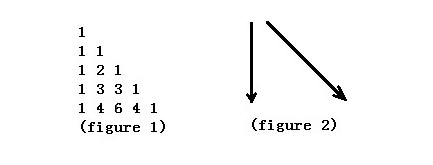尽量沿着边走距离最短。化减后 C(n+1,k)+ n - k,
预处理阶乘,Lucas定理组合数取模
DP?
Time Limit: 10000/3000 MS (Java/Others) Memory Limit: 128000/128000 K (Java/Others)Total Submission(s): 1899 Accepted Submission(s): 633
Problem Description

Figure 1 shows the Yang Hui Triangle. We number the row from top to bottom 0,1,2,…and the column from left to right 0,1,2,….If using C(n,k) represents the number of row n, column k. The Yang Hui Triangle has a regular pattern as follows.
C(n,0)=C(n,n)=1 (n ≥ 0)
C(n,k)=C(n-1,k-1)+C(n-1,k) (0<k<n)
Write a program that calculates the minimum sum of numbers passed on a route that starts at the top and ends at row n, column k. Each step can go either straight down or diagonally down to the right like figure 2.
As the answer may be very large, you only need to output the answer mod p which is a prime.
Input
Input to the problem will consists of series of up to 100000 data sets. For each data there is a line contains three integers n, k(0<=k<=n<10^9) p(p<10^4 and p is a prime) . Input is terminated by end-of-file.
Output
For every test case, you should output "Case #C: " first, where C indicates the case number and starts at 1.Then output the minimum sum mod p.
Sample Input
1 1 2 4 2 7
Sample Output
Case #1: 0 Case #2: 5
Author
phyxnj@UESTC
Source
#include <iostream>
#include <cstdio>
#include <cstring>
#include <algorithm>
using namespace std;
typedef long long int LL;
LL n,k,p;
LL fact[1300][11000];
LL QuickPow(LL x,LL t,LL m)
{
if(t==0) return 1LL;
LL e=x,ret=1LL;
while(t)
{
if(t&1LL) ret=(ret*e)%m;
e=(e*e)%m;
t>>=1LL;
}
return ret%m;
}
int prime[2000],pr;
bool vis[10100];
void get_prime()
{
for(int i=2;i<10100;i++)
{
if(vis[i]==false)
prime[pr++]=i;
for(int j=2*i;j<10100;j+=i)
vis[j]=true;
}
}
void get_fact()
{
for(int i=0;i<1240;i++)
{
fact[i][0]=1LL;
for(int j=1;j<=prime[i]+10;j++)
{
fact[i][j]=(fact[i][j-1]*j)%prime[i];
}
}
}
LL Lucas(LL n,LL m,LL p)
{
LL ret=1LL;
int id=lower_bound(prime,prime+pr,p)-prime;
while(n&&m)
{
LL a=n%p,b=m%p;
if(a<b) return 0;
ret=(ret*fact[id][a]*QuickPow((fact[id][b]*fact[id][a-b])%p,p-2,p)%p)%p;
n/=p; m/=p;
}
return ret%p;
}
int main()
{
get_prime();
get_fact();
int cas=1;
while(scanf("%I64d%I64d%I64d",&n,&k,&p)!=EOF)
{
if(k>n/2) k=n-k;
LL ans=(Lucas(n+1,k,p)+n-k)%p;
printf("Case #%d: %I64d
",cas++,ans);
}
return 0;
}